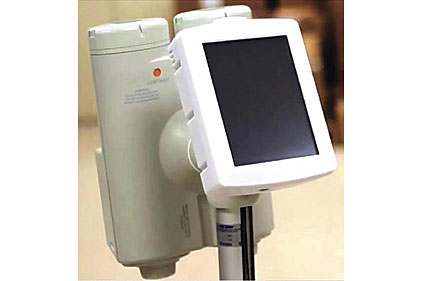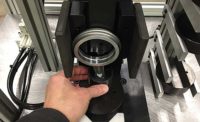Headquartered in Eden Prairie, MN, the company makes devices that infuse dye into the vascular system, letting physicians visualize anatomies.

|
|
In 2011, Acist redesigned its lower-pressure
EmpowerCTA display using 36 new parts. Seven were FDM parts, including the system’s casing. Photo courtesy Stratasys Inc.
|
The devices are growing in popularity and are now used by doctors and clinicians in more than 40 countries. This success has kept Acist steadfast in its mission: to research and produce new medical technologies that help physicians obtain the most perfect anatomical images possible.
In recent years, Acist has been using fused deposition modeling (FDM) to quickly and cost-efficiently update and develop new infusion devices that meet their customers’ needs. FDM also lets Acist produce small runs and get feedback from customers before committing to expensive production molds.
Stratasys Inc. invented FDM technology, which creates functional prototypes and manufactured goods directly from any CAD file in just a few hours. Acist prints the items on two Dimension 3D printers or a Fortus 3D production system, all of which are made by Stratasys.
“FDM is the ultimate lean technology,” says Dave Scott, manufacturing engineering manager at Acist. “It allows for putting greater complexity, form and function into one part as opposed to traditional methods. We use it for fixtures, functional testing, industrial design and end-use parts. We want to use as many FDM parts as possible.”
In 2011, Acist redesigned its lower-pressure EmpowerCTA display using 36 new parts. Seven were FDM parts, including the system’s casing. Acist designed the FDM parts around machined parts, circuit boards and integrated circuits to optimize manufacturing design.
More importantly, FDM enabled Acist to redesign the EmpowerCTA display so it had fewer but more-complex parts. The seven FDM parts replaced 15 injection-molded parts.
FDM also allowed Acist to quickly design, print and ship a part to a hospital so medical personnel could connect their infusion device to many types of transducers and rapidly switch among them.
A final benefit of the technology is that it eliminates the need for Acist to maintain an inventory of actual parts onsite or offsite. Now the company’s inventory consists of digital files on a server. Whenever a customer needs an FDM part, Acist simply prints out a replacement and ships it the next day.
For more information about FDM technology, call 888-480-3548 or visit www.stratasys.com.




